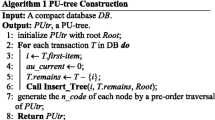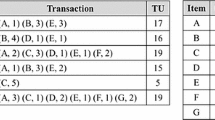Abstract
Recently, many approaches for high utility pattern mining (HUPM) have been proposed, but most of them aim at mining high-utility patterns (HUPs) instead of frequent ones. The major drawback is that any combination of a low-utility item with a very high utility pattern is regarded as a HUP, even if this combination is infrequent and contains items that rarely co-occur. Thus, the HUIPM algorithm was proposed to derive high utility interesting patterns (HUIPs) with strong frequency affinity. However, it recursively constructs a series of conditional trees to produce candidates, and then derive the HUIPs. It is time-consuming and may lead to a combinatorial explosion. In this paper, a Fast algorithm for mining Discriminative High Utility Patterns with strong frequency affinity (FDHUP) is proposed by considering both the utility and frequency affinity constraints. Two compact structures named EI-table and FU-table, and two pruning strategies are designed to reduce the search space, and efficiently and effectively discover DHUPs. Experimental results show that the proposed FDHUP algorithm considerably outperforms the state-of-the-art HUIPM algorithm in all datasets.
Access this chapter
Tax calculation will be finalised at checkout
Purchases are for personal use only
Similar content being viewed by others
References
Frequent itemset mining dataset repository. http://fimi.ua.ac.be/data/
Agrawal, R., Imielinski, T., Swami, A.: Database mining: a performance perspective. IEEE Trans. Knowl. Data Eng. 5(6), 914–925 (1993)
Agrawal, R., Srikant, R.: Fast algorithms for mining association rules in large databases. In: The Intentional Conference on Very Large Data Bases, pp. 487–499 (1994)
Agrawal, R., Srikant, R.: Quest synthetic data generator. http://www.Almaden.ibm.com/cs/quest/syndata.html
Ahmed, C.F., Tanbeer, S.K., Jeong, B.S., Le, H.J.: Efficient tree structures for high utility pattern mining in incremental databases. IEEE Trans. Knowl. Data Eng. 21(12), 1708–1721 (2009)
Ahmed, C.F., Tanbeer, S.K., Jeong, B.S., Choi, Y.K.: A framework for mining interesting high utility patterns with a strong frequency affinity. Inf. Sci. 181(21), 4878–4894 (2011)
Chan, R., Yang, Q., Shen, D.: Minging high utility itemsets. In: IEEE International Conference on Data Mining, pp. 19–26 (2003)
Chen, M.S., Han, J., Yu, P.S.: Data mining: an overview from a database perspective. IEEE Trans. Knowl. Data Eng. 8(6), 866–883 (1996)
Fournier-Viger, P., Wu, C.-W., Zida, S., Tseng, V.S.: FHM: faster high-utility itemset mining using estimated utility co-occurrence pruning. In: Andreasen, T., Christiansen, H., Cubero, J.-C., Raś, Z.W. (eds.) ISMIS 2014. LNCS, vol. 8502, pp. 83–92. Springer, Heidelberg (2014)
Lin, J.C.-W., Gan, W., Hong, T.-P., Pan, J.-S.: Incrementally updating high-utility itemsets with transaction insertion. In: Luo, X., Yu, J.X., Li, Z. (eds.) ADMA 2014. LNCS, vol. 8933, pp. 44–56. Springer, Heidelberg (2014)
Lin, J.C.W., Gan, W., Fournier-Viger, P., Hong, T.P.: Mining high-utility itemsets with multiple minimum utility thresholds. In: The International C* Conference on Computer Science and Software Engineering, pp. 9–17 (2015)
Liu, M., Qu, J.: Mining high utility itemsets without candidate generation. In: ACM International Conference on Information and Knowledge Management, pp. 55–64 (2012)
Liu, Y., Liao, W., Choudhary, A.K.: A two-phase algorithm for fast discovery of high utility itemsets. In: Ho, T.-B., Cheung, D., Liu, H. (eds.) PAKDD 2005. LNCS (LNAI), vol. 3518, pp. 689–695. Springer, Heidelberg (2005)
Rymon, R.: Search through systematic set enumeration. Technical reports, 297 (1992)
Tseng, V.S., Wu, C.W., Shie, B.E., Yu, P.S.: UP-Growth: an efficient algorithm for high utility itemset mining. In: ACM SIGKDD International Conference on Knowledge Discovery and Data Mining, pp. 253–262 (2010)
Tseng, V.S., Wu, C.W., Shie, B.E., Yu, P.S.: Efficient algorithms for mining high utility itemsets from transactional databases. IEEE Trans. Knowl. Data Eng. 25(8), 1772–1786 (2013)
Yao, H., Hamilton, H.J., Butz, C.J.: A foundational approach to mining itemset utilities from databases. In: SIAM International Conference on Data Mining, pp. 211–225 (2004)
Author information
Authors and Affiliations
Corresponding author
Editor information
Editors and Affiliations
Rights and permissions
Copyright information
© 2016 Springer-Verlag Berlin Heidelberg
About this paper
Cite this paper
Lin, J.CW., Gan, W., Fournier-Viger, P., Hong, TP. (2016). Mining Discriminative High Utility Patterns. In: Nguyen, N.T., Trawiński, B., Fujita, H., Hong, TP. (eds) Intelligent Information and Database Systems. ACIIDS 2016. Lecture Notes in Computer Science(), vol 9622. Springer, Berlin, Heidelberg. https://doi.org/10.1007/978-3-662-49390-8_21
Download citation
DOI: https://doi.org/10.1007/978-3-662-49390-8_21
Publisher Name: Springer, Berlin, Heidelberg
Print ISBN: 978-3-662-49389-2
Online ISBN: 978-3-662-49390-8
eBook Packages: Computer ScienceComputer Science (R0)




